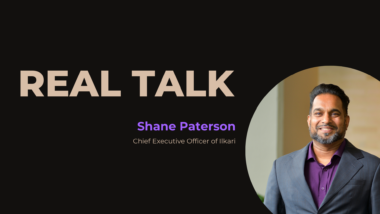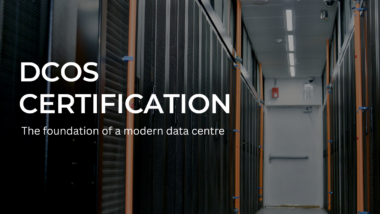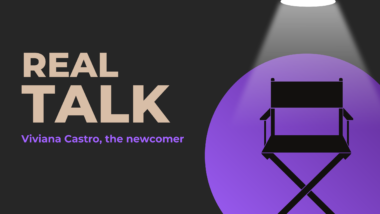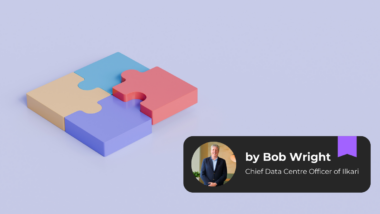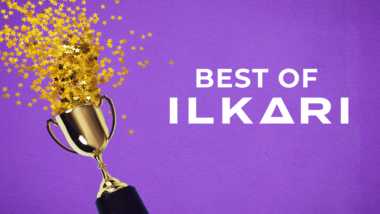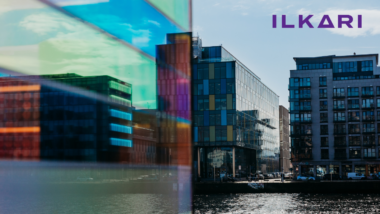The spectacular sound of culture capital
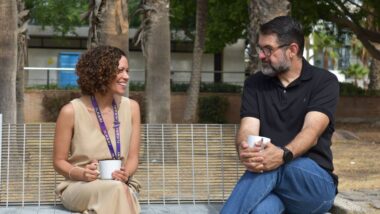
Okay, before you roll your eyes and say, ‘Oh no,’ it is not another article on why culture is necessary, and we do culture. We want you to know this is not that kind of article.
So, Con Spathas, Chief Operating Officer, and Mariella Santos, Head of People and Workplace, sat down in Malaga one sunny afternoon to chat about what company culture sounds like. Here’s what happened.
Con Spathas: For me, Mariella, like any good mouthwatering recipe, you need some key ingredients when it comes to culture. A staple ingredient, obviously, is People. Great! Some companies think they can just bring in a group of people; voila! We’ve got culture. But you have to build a sense of community among people who stand by each other, cheering each other on through the good times and providing genuine support at those not-so-good times.
Mariella Santos: I like the recipe approach. A company’s culture is one of the most important things for me. It has to be created purposefully—the culture shapes everything you mentioned – and that’s when a job becomes meaningful. I also think culture immensely impacts employee engagement, and that’s where everything else begins–a sense of belonging and community, communication and productivity.
Con: It’s about knowing that the other person “has your back” and you feel supported.
Mariella: Well, yes, naturally. And that kind of culture capital starts with how we do things, treat, work and communicate with each other–it incubates a culture ecosystem based on behaviours and values.
Con: The word culture is a buzzword in most places. Nothing more than a tick in the box that says, “Well, we’ve done this, this, and this – now we have culture.”
Mariella: Yeah, that doesn’t work. It isn’t authentic, and it’s unreasonable to assume that people who come to work every day with you are motivated by a poster.
Con: Exactly. We must fiercely protect the idea that we’re all human and have our own unique swagger. Not everyone will be compatible at every company, and that’s okay. The company’s strength isn’t just in its revenues or bottom line but also in an environment of mutual respect and freedom to share their voice, with the assurances they won’t be persecuted when they do.
This means building a community where the courage of respectful voice and opinion is heralded versus quashed. We’re all entitled to throw our toys out of the pram here and there too, but ultimately a company respects that we’re human, allows us to make mistakes, and we aren’t afraid to embrace the idea that we can simply screw a few things up – and it’s okay if we learn from that experience.
Mariella: You are talking about creating a culture where you can bring your whole self to work authentically, with integrity and purpose. What were the other ingredients in your culture recipe, Con?
Con: Hands down, behaviours and attitudes. This is where the community builds its strength. If the people are the bricks, then the mortar holds the bricks together, and that is formed from the behaviours and attitudes we bring to bear.
You’ll notice I haven’t touched on leadership so far.
Mariella: I did notice that. Leadership is the other element of a strong culture capital. You can’t say you want a culture where everyone can be authentic and have a leadership team that isn’t in the game.
Con. Yes, and leadership is key for seeding the kind of culture the company is looking for; the manifestation of culture itself belongs to the community of people who live and breathe it across the organisation.
People often mistake leadership for some kind of deity, able to whip up culture as a slide deck and say again, “Voila!” The reality, for me at least, is that everyone in an organisation is responsible for fostering, nurturing, and—above all else—protecting the culture of the community.
Mariella: Yes, back to integrity, purpose and meaning.
Con: Valuing people as people, not resources. Is it going to sound like a cliché if I call out our CEO, Shane Paterson?
Mariella: No, because Shane is one of our key ingredients in your recipe analogy.
Con: Lol. Yes, I think that Shane is our biggest super weapon.
Mariella: Could we say superhero?
Con: Even better! In full disclosure, I have known Shane for 20 years, and he’s more than a boss and colleague to me. When he first gathered Ilkari’s leadership team, he spoke right from the start, before even getting into anything else, about the kind of organisation he envisioned–not growing too fast, setting people up for success, nurturing and developing those people who actively contribute to the growth and success of our community.
Mariella: He’s all about people as our superpower.
Con. For sure. His superpower is that he was an IT professional way back in the day, so he has seen a lot of change in how organisations were managed and grew. He places a high degree of value on people being core to Ilkari—not just its own people but the people who buy our products and services—our customers – after all they’re people too! He has a vision of one Ilkari—the community.
Mariella: That is one of the reasons I believe Ilkari is special. It’s shaped by each person in our community across three countries. You have a word for what we create here and how we build our cultural capital.
Con: Yes. Ilkarians. We want our people to actively create, promote and protect our living, breathing culture. We want it to grow and adapt and for every Ilkarian to act as its custodian to keep our strong and hearty culture alive. Was that too much?
Mariella: A little. But that’s what we love about you.
